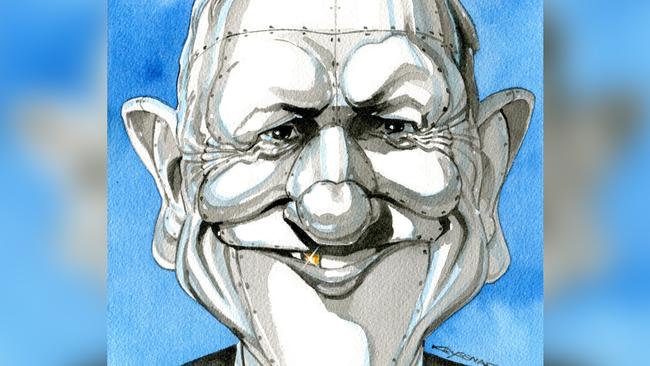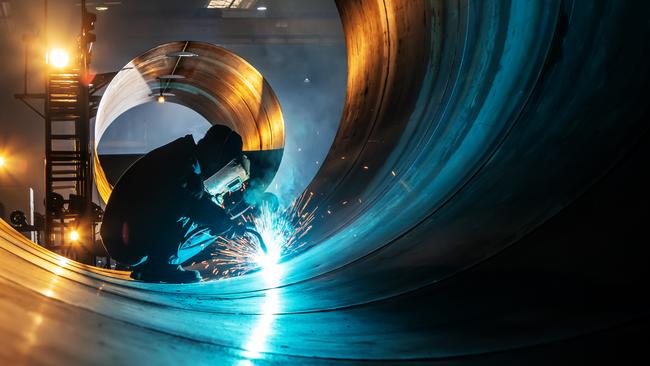High spirits among traders at revived Australian Steel Association Conference

ASA members are optimists by nature. Short-term headwinds abound but Selection Steel’s Rod Gregory spoke for most when he told The Weekend Australian demand was strong for the rest of this year, followed by a slight dip in the first part of next year and then onwards and upwards.
Monopoly steel sector producers BlueScope and Infrabuild maintain an iron grip over the market with the help of the Australian Dumping Commission, restricting imports to about 15 per cent of the market.
The strength of the local market is reflected in a recent ADC draft ruling that while merchant bar from Taiwan was sold in Australia at up to 18 per cent below normal prices in Taiwan no injury was shown to the complainant, InfraBuild, so no dumping.
BlueScope has a list price for hot rolled coil around $1700 a tonne but a laundry list of rebates for big orders, long-time customers, those who pay early, those wearing white shoes etc, reducing the real price to $1500 a tonne.
Imports this year are expected to reach two million tonnes for the first time since 2018 after running through Covid at 1.6 million tonnes. While confidence is high, sheds at steel distributors around the country are overflowing in part because shipping delays have caused overstocking, and delays in other products such as concrete or timber are delaying building projects.

Costs have risen, as shown by a UBS note saying Australian steel volumes for BlueScope would be steady at around 3.4 million tonnes and revenues down 19 per cent to $6.2bn next year from $7.7bn in 2022, but earnings would be down 43 per cent from $1.2bn to $683m. Shipping costs for bulk carriers have increased from $10,000 a day in 2019 to $30,000 a day this year, while container ships are running at $170,000 a day, up from $28,000, over the same period.
Covid-19 and other delays have resulted in shipping times from China to the US and then Europe at 101 days against 76 days as further evidence of supply chain problems. These are now a given and new ships are being built to meet demand.
These issues aside, the industry is assuming strong demand will carry it through next year, which all suggests while a slowdown is a long forecast it won’t be the doomsday some fear.
Clearing the air
Energy Minister Chris Bowen is expected next week to detail more plans for his carbon market review ahead of the July 2023 start for his new safeguard mechanism, to help fast-forward emissions reduction.
Bowen was hit with the energy collapse on taking office, but with the immediate danger easing, now comes the detailed work on a revised carbon emissions policy.
He will address a Carbon Market Institute symposium in Melbourne on Friday, when his plans should become clearer.
Much needs to be done ahead of the new safeguards in July next year. Bowen wants to review the present ACCU market, run by the Clean Energy Regulator, where carbon credits issued by the Emissions Reduction Fund are traded.
This includes co-ordinating between the present baseline credits scheme, where companies that cut emissions below their baseline receive credits.
The latter will be toughened, requiring more emission cuts and the key will be setting the right baselines. The offsets market will be boosted by increased demand through tougher safeguards, which should increase prices and improve liquidity.
Around 200,000 ACCUS are traded every month but in May, around the election, it increased fivefold to one million units with price per tonne up to the $35-$37 range.
Bowen has also flagged governance reviews, including the operation of the emissions reductions assurance committee (ERAC) and integrity issues, including those raised by ANU Professor Andrew Macintosh. These concern baselines for methods covering landfill gas projects and human-induced regeneration.
Bowen’s review is well-timed given the present market has run for a decade, and ahead of his changes on safeguards.
The industry supports the review and has a long wish-list, starting with better governance arrangements and increased transparency.
Market Advisory Group’s Raf Wood is keen for the review to clarify two key issues: what to do with voluntary credits and safeguard baselines.
ANU’s Macintosh has raised two integrity issues – one over baselines for the waste dump emission carbon credits and another over the awarding of projects in the middle of a desert for human-induced regeneration credits.
These will be reviewed to avoid credits being issued for things already being done.
The key is “additionality” – awarding credits for things which would not otherwise be done. Transparency is also important.
Already industry is starting to bring out a laundry list of suggested credit methods, with BHP flagging its West Australian sludge dams as being the natural storage site for carbon to cover its other emissions.
A congo line of proposals will start appearing again, now there is a government with the promise of carbon credibility.
The ERF carbon credit market is important because without offsets Australia will not go close to meeting targets, but there will also be debates on just how to score reduction methods on Australia’s emission reduction lists.
The key is policy certainty.
Separately, The KKR and Ontario Teachers-backed carbon project developer Green Collar has added former ACF boss Mara Bun and Harris Farms founder Catherine Harris to its board.
The two, along with chair Grant King, are the only independents joining the founders, James Schultz and Lewis Tyndall, and two each from KKR and Ontario Teachers.
Wanted: watchdog
Treasurer Jim Chalmers has one gap to fill at the ACCC, with consumer deputy chair Delia Rickards’ 10 year term due to expire next month.
Former Treasurer Josh Frydenberg pre-empted the incoming government in appointing the highly regarded Gina Cass-Gottlieb to the chair, but left the deputy role for Chalmers to fill.
Traditionally the ACCC has one consumer deputy chair and one small business deputy – even though sector-specific roles are an anathema to policy purists, because decisions should be made on an economy-wide basis.
Teething problems
Coles chief Steven Cain has long talked up his partnership with UK-based fulfilment group Ocado, but the company is attracting plenty of talk in Britain after two capital raisings totalling some $2.8 bn.
Ocado’s stock price is down some 70 per cent from its highs in the wake of the capital raisings, the slowdown in British consumer spending and post-Covid decline in market share for online sales.
Britain’s online share in groceries, at 12 per cent, is ahead of Australia but down from the Covid peak of 14 per cent.
Coles figures show online purchases at the supermarket chain are at 7.9 per cent, up from 5.6 per cent a year ago, compared with Woolworths at 9.9 per cent.
Coles is building two Ocado- designed robotic fulfilment centres in Australia in 2024.
Woolworths fills its online orders through a combination of two purposes-built centres and supplies at its supermarkets.



More than 100 steel traders and importers gathered on Queensland’s Sunshine Coast this week for the revived annual Australian Steel Association Conference which was surprisingly upbeat, with demand forecasts strong out to 2025.